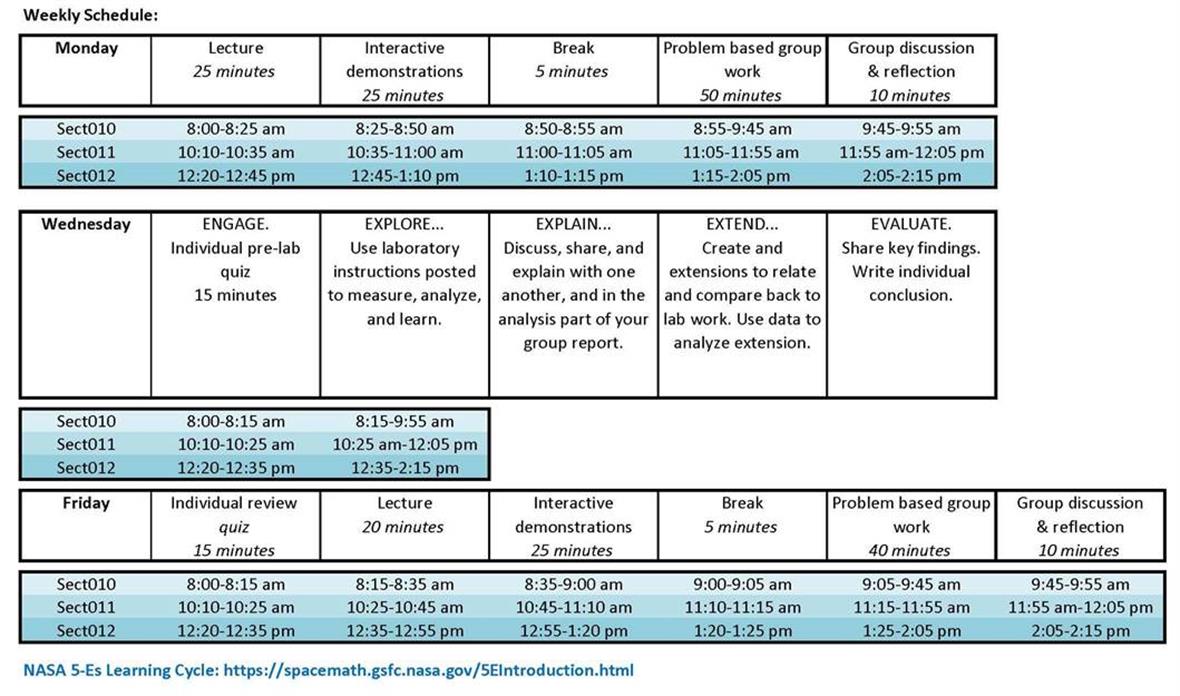SCEN 101 focuses on an integrated approach to Physical Science and Astronomy, where pre-service teachers and other majors learn to connect physics and astronomy concepts to real-life situations and other disciplines. The SCEN 101 education team promotes holistic student development and encourages both individual and group participation through interactive learning.
Course Stats
- 4-credit course
- Spring and fall semesters
- 3 sections: 010, 011, 012
- 48 students per section
- 144 students total
- Students
- Mostly first-year students
- 60-70% education majors
- Other majors, such as: Psychology, Business, Statistics, Math, Philosophy, Fine Arts
Education Team
One Faculty – Adebanjo Oriade
One Preceptor – Christina Wesolek
One Laboratory Coordinator – Judi Free
One Education Technology Specialist – Tim Leefeldt
Six Graduate Teaching Assistants – varies per semester
Four to six Studio Fellows – varies per semester
Learning Objectives
[LO1] Communicating the nature of science by learning physics concepts: by seeing how science compares with and how science applies to the arts, religion, and philosophy.
[LO2] Applying the knowledge of physics concepts: especially to solving (real, life) problems.
[LO3] Experimentation: learning some of the ways scientists work, especially the role of experimentation.
[LO4] Collaboration: building interdisciplinary collaboration skills during various group work activity.
[LO5] Critical thinking: identify and appreciate the role of science in a diversity of disciplines/activities/places/environments/ecosystems that matter to you, and reflectively share that appreciation.

Learning Components
- Discussion/Lecture with Interactive Demonstrations
- Homework, quizzes, and exams (individual*)
- Homework, quizzes, and exams (individual*)
- Problem-based Learning with Group Discussion & Reflection
- Explore and complete work using conceptual drawings, descriptive explanations, and computation (PBL group*)
- Experiential-based Learning (EBL) (or Laboratory) with three components
- Pre-lab Quiz (individual*)
- Experiential-based Learning (EBL group*)
- Reflection and Extension (individual*)
- Semester Project connecting real-life application and physics concepts with three components
(PBL group*)
- Real-life Connection paper and presentation – linking a real-life topic with physics or astronomy topic(s) and providing possible explored experiments.
- Abstract and proposal presentation – a scientific summary of the project, which includes a hypothesis, predictions, well-thought out experiment(s), and the connection between the real-life topic and concepts and how they relate back to the project’s purpose.
- Poster and poster conference – visual depiction of the project in its entirety that includes the real-life topic, physics or astronomy concept(s), and experimentation, using figures/graphs,
diagrams, tables, photos, and other interactive materials.
- Peer Evaluation
(PBL and EBL groups*)
- Students have the opportunity to assess themselves and offer fellow group members feedback for work that is completed in PBL, EBL, and the semester project. This encourages students to take ownership of their group work, be honest with the working relationship they have with their group mates and themselves, and develop and strengthen healthy communication skills.
*In SCEN 101, students complete their work both individually and as part of two kinds of student groups (5-6 PBL group members and 2-3 EBL group members).
Weekly Schedule

Monday and Friday engages students beginning with an interactive Discussion/Lecture lead by the faculty member and ending with a Problem-based Learning session lead by the Preceptor with support from Graduate Teaching Assistants and Studio Fellows. Wednesday students spend almost two-hours engaging, exploring, explaining, extending, and evaluating during experiential (or laboratory) learning. The experiential learning day includes guidance from Graduate Teaching Assistants, the Preceptor, and other education team members as needed.
Technology Overview
In SCEN 101, technology is an essential part of the course; being utilized in the different learning components for analyzing, communicating, and collaborating. Below is a sample of what is used throughout a typical semester.
→ iPads
- Apps
- Canvas by Instructure Inc.
- Google Drive by Google
- Notability by Ginger Labs
- Graphical Analysis and Video Physics by Vernier Software & Technology
→ Vernier Products
- LabQuest2 and Sensors
- Wireless Dynamics Sensor System (WDSS)
- Wide-Range Temperature Probe
- Microphone
- Magnetic Field Sensor
